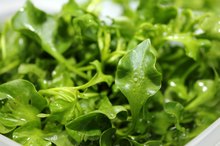How to Make a Rosemary & Olive Oil Infusion
Rosemary and olive oil infusion isn't difficult to make and can quickly add a new dimension to your culinary skills 2. Use the aromatic blend instead of herbs and spices in meat and vegetable dishes. Drizzle the oil over pasta, use it as a dipping sauce for your favorite crusty Italian bread or as a starter for sauces, marinades and salad dressings. A rosemary and olive oil infusion also can be a gift for the foodies on your list 2.
Place 2 1/2 cups extra virgin olive oil in a heavy glass, stainless steel or enamel saucepan 2. Avoid aluminum, which can discolor the oil and impart a metallic taste.
How to Make Face Cream Using Rosehip Oil
Learn More
Add 1 cup dried rosemary. If you have fresh rosemary, dry it first, as the moisture in fresh rosemary can cause the oil to spoil quickly. Avoid using any water in the olive oil infusion, as even a small amount of water can harbor bacteria, which can cause botulism 2. To dry fresh rosemary, place the herbs in the sun or dry the rosemary in a food dehydrator until all moisture is removed.
Place the saucepan on medium heat and heat the oil and rosemary to 140 degrees Fahrenheit. If you don't have a cooking thermometer, heat the mixture until the oil just begins to bubble. Allow the mixture to simmer slowly for five minutes.
How do I Heat Vicks VapoRub in Water to Relieve Sinus Pressure?
Learn More
Pour the mixture into a mixing bowl and allow it to cool, then add 2 1/2 additional cups extra virgin olive oil 2. If desired, leave the rosemary in the oil for decoration and flavor, or strain the rosemary and olive oil infusion by pouring it through a fine mesh sieve lined with cheesecloth 2.
Pour the rosemary and olive oil infusion into a glass bottle 2. Cap the bottle securely and store the oil in the refrigerator for up to one month.
Related Articles
References
- Exploratorium: The Science of Cooking, Infused Oils
- Olive Oil Source: Infusing Olive Oil
- Rosemary. Full Professional Monograph. Natural Medicines Comprehensive Database. 8/16/2018.
- Fernández LF, Palomino OM, Frutos G. Effectiveness of Rosmarinus officinalis essential oil as antihypotensive agent in primary hypotensive patients and its influence on health-related quality of life. J Ethnopharmacol. 2014;151(1):509-16. doi:10.1016/j.jep.2013.11.006
- Hay IC, Jamieson M, Ormerod AD. Randomized trial of aromatherapy. Successful treatment for alopecia areata. Arch Dermatol. 1998;134(11):1349-52. doi: 10.1016/s0965-2299(99)80147-2
- Lindheimer JB, Loy BD, O’Connor PJ. (2013). Short-term effects of black pepper (piper nigrum) and rosemary (rosmarinus officinalis and rosmarinus eriocalyx) on sustained attention and on energy and fatigue mood states in young adults with low energy. Journal of Medicinal Food. 2013;16(8):765–771. doi:10.1089/jmf.2012.0216
- Mahyari S, Mahyari B, Emami SA, et al. Evaluation of the efficacy of a polyherbal mouthwash containing Zingiber officinale, Rosmarinus officinalis and Calendula officinalis extracts in patients with gingivitis: A randomized double-blind placebo-controlled trial. Complement Ther Clin Pract. 2016;22:93-8. doi:10.1016/j.ctcp.2015.12.001
- Martynyuk L, Martynyuk L, Ruzhitska O, Martynyuk O. Effect of the herbal combination Canephron N on diabetic nephropathy in patients with diabetes mellitus: results of a comparative cohort study. J Altern Complement Med. 2014;20(6):472-8. doi:10.1089/acm.2013.0400
- Minich DM, Bland JS, Katke J, et al. Clinical safety and efficacy of NG440: a novel combination of rho iso-alpha acids from hops, rosemary, and oleanolic acid for inflammatory conditions. Can J Physiol Pharmacol. 2007;85(9):872-83. doi:10.1139/y07-055
Writer Bio
M.H. Dyer began her writing career as a staff writer at a community newspaper and is now a full-time commercial writer. She writes about a variety of topics, with a focus on sustainable, pesticide- and herbicide-free gardening. She is an Oregon State University Master Gardener and Master Naturalist and holds a Master of Fine Arts in creative nonfiction writing.









